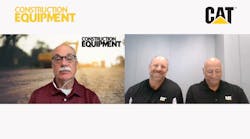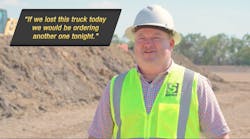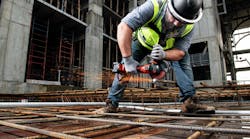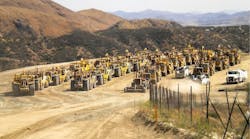Over the last decade, the worldwide rise in oil prices has prompted the drilling of thousands of new wells in Texas. But these wells, when pumping, will yield high-quality, Texas natural gas. Surprising though it may seem, while the interest in Texas oil is still high, Texas natural gas production represents about 29 percent of the total U.S. annual demand, and the number of producing wells in the Lone Star State reflects that, rising from 55,000 in 1996 to 76,500 less than a decade later. The fact that the majority of those new wells are in heavily wooded areas spells headaches for the well owners or developers and opportunity for grinding companies like SMS Woodstone, Inc. who clear for roads, pipeline and pads to make drilling possible. Armed with a pair of Morbark 1300 tub grinders the Burleson, Texas-based company has paralleled the growth in drilling activity, nearly doubling in size in the last four years alone and, in the process, becoming one of the most sought-after firms for that type of work.
Van Conversion to Waste DiversionAs is the case with many in the land-clearing business today, Tom Steele's background is in an area not even remotely connected to wood waste grinding. In fact, the Burleson resident made a name for himself as one of the Dallas-Ft. Worth area's more popular van conversion specialists.
"Actually, we did more than just conversions," he says. "We really did it all: I had a metal shop that built seat frames for the vehicles, a cabinet shop to do our own cabinetry for the interiors, at one point I had five corporations operating at the same time. I did that for about 12 years, then saw firsthand what a risky business this can be. At the start of the first gas crunch in the 1970s there were 31 van conversion companies in the metroplex. After the smoke had cleared, only nine made it through. We were fortunate enough to have been one of the nine, but it really got my attention."
Because of the amount of waste generated as part of a conversion operation, trimmings, cardboard, metal, and wood, in particular, Steele was always looking for the best, most economical way to dispose of that material. He connected with an area recycling firm and quickly impressed the owner of that company with his business sense.
"He had a big wood and cardboard recycling company in Mansfield, Texas, and told me if I ever wanted a career change, he'd like me to run his company. So when I made the decision to leave the van business I called him and got my first taste of the recycling world."
An Eye OpenerSteele's impact on the company's profitability was quick and impressive. The firm had a contract with an Oklahoma paper mill to which all of its ground up wood waste was hauled on a daily basis. The fact that those trucks came back to Texas empty simply made no sense to Steele.
"Our profit was based on the tipping fee we got at our site and nothing else," he says. One breakdown and that profit was gone. I saw that any material we could pick up in Oklahoma for haul back to our site would be pure profit. We did and it not only proved profitable — we went from a fleet of four trucks to 10 — it also opened my eyes to getting into this business for myself."
With that seed of an idea planted, Steele contacted Cecil Miskin, a business associate from past projects and, in 2002, established SMS Woodstone. Its first official contract was with the city of Dallas to process their green waste — a contract they still hold today.
"We believed then and still do that city contracts offer a bit of stability. Cities always have waste and, for the most part, always have the funds. So we started with the city of Dallas, added Burleson to the list and have gone as far away as Midland, Texas, for work. Generally though, we try to stay within a 150-mile radius of the Dallas-Ft. Worth area."
Lessons LearnedSteele says his experience with the wood waste firm taught him many things about the business, not the least of which was the importance equipment can play in your production and profitability.
"That firm relied on a couple of old, undersized, maintenance-plagued grinders. I knew when I started SMS that I would not make the same mistake — and I haven't. I researched the heck out of every grinder and its manufacturer and chose first one Morbark 1300 tub grinder, then later a second unit. I went to Morbark's plant in Winn, Mich., and, because I come from a production background, was very impressed with what I saw. The one thought that ran through my mind was: 'This equipment is built to last and this company will be around for a long time.' They also had an excellent reputation for customer service which is something I feel strongly about as well; all these things did it for me."
Well, Well, WellSteele's Morbark 1300s have helped him grow into one of the area's busiest grinding companies. A couple years back however, Steele was contacted by a gas pipeline company to do some clearing and things have never been the same.
"Since the push began to service the gas well companies, probably 50 percent of our work is well related: either on pipeline right of ways, gas well drill sites right of way or lease road right of way. We are currently working with six gas companies and are in line with another large oil company that could, if we wanted, keep us busy seven days a week."
The North Texas counties rimming the western side of the Dallas/Fort Worth metroplex make up the Barnett Shale gas formation, which is seeing the most drilling activity. Companies that were once content to leave these sources untapped are now opting to clear land and begin drilling. In response, Steele's firm has doubled in size in four years and is looking at additional equipment purchases.
"We have already started looking into the purchase of a Morbark stump shear and are seriously considering a track-mounted grinder from Morbark, probably a Model 6600 Wood Hog," he says. "Both of these will directly benefit us on the well-clearing jobs. The shear will help us downsize some of the massive stumps we are encountering and, because efficiency and speed are big concerns, the mobility of a track-grinder can be a huge advantage."
Capital IdeaSeveral of the companies with which he has well-clearing contracts require that SMS remove the material from the site. While some might see this as an inconvenience or a potential drain on profits, Steele, in typical fashion, sees it as yet another opportunity.
"Right now we are stockpiling the material but I just bought a live-bottom trailer and we will soon begin creating a mulch product. We have the material, we have the equipment to create a clean valuable product; I think it could work out nicely for us. The general thought is that the demand for additional gas wells — and the need to clear for them — could go on for another 10 years. I'm 66 years old now and hope to turn the business over to my son, but I suppose I could hold off retirement that long.



